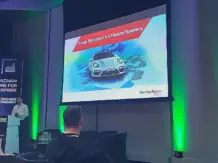Deutsche Telekom, T-Mobile US, Telefonica and Orange are currently testing a private blockchain based on Hyperledger Fabric in order to automate their roaming contracts and associated costs. Operators hope to better manage the complexity of new generation networks.
The telecoms universe is characterized by numerous interactions between operators. homelessness is one of those scenarios. When the customer of an operator uses his telephone abroad on the network of another operator, he is thus in a situation of roaming.
And this results in invoicing between the two operators. These transactions and interconnections between networks are constant. Several global operators are testing a solution blockchain to automate the financial aspects of these roaming agreements.
Roaming contracts coded in a Hyperledger blockchain
In this context, the research laboratory (T-Labs) of the German operator Deutsche Telekom has developed a private blockchain network Hyperledger Fabric. A pilot is being conducted in partnership with three international telecoms players: T-Mobile US, Telefonica and Orange.
According to the companies involved in the project, the use of blockchain contributes significantly to reducing the complexity of the current process governing roaming and its financial terms between operators.
These terms are thus defined in the form of rules integrated into a smart contract. They are known to members and cannot be changed unilaterally, and therefore apply automatically.
The four operators are already considering extending the use of this private blockchain to also automate the processes on the wholesale roaming markets and various inter-company regulations.
Blockchain to support new telecom services
Blockchain could also be a response to the increasing complexity of interconnections between new types of networks and telecom services, said a senior executive of Deutsche Telekom.
The workflow between operators when it comes to roaming has hardly changed in the past 20 years. However, in the near future, new services such as NB-IoT, LTE-M or VoLTE and other quality-based services will significantly increase the complexity of operator-to-operator delivery agreements and associated payments. This blockchain-based solution is the start of automating parts of our workflow, ”
Telecom operators confirm their interest in any case blockchain. In fact, several of these same partners have recently invested in the capital of a startup specialized in the deployment of this technology in the telecoms sector: Clear. The publisher is developing a platform based on the public blockchain Ethereum.
















